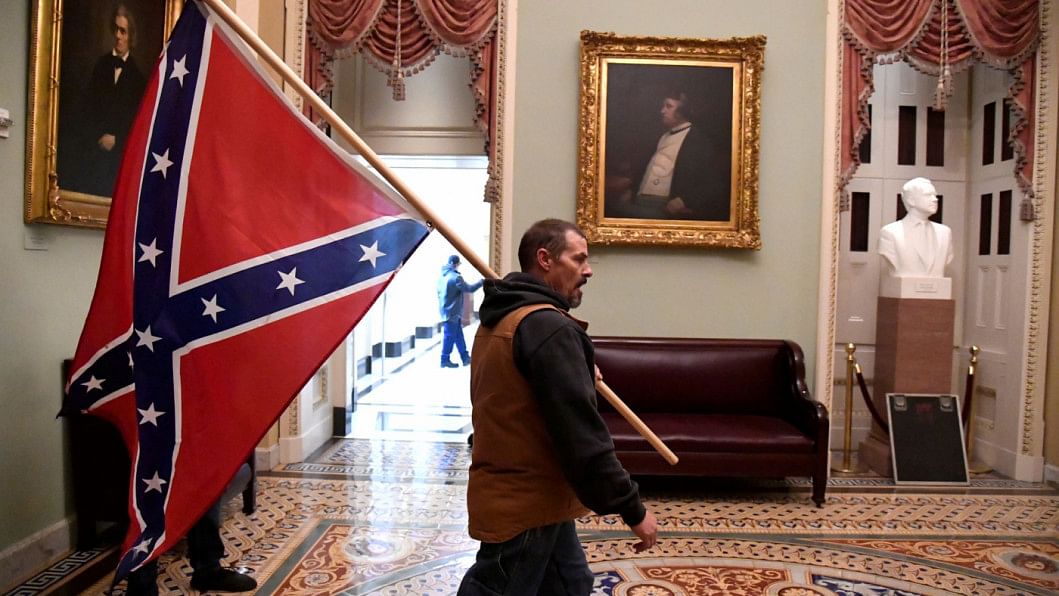America’s dangerous descent into violence

The mass shootings that regularly disrupt American life should not be viewed simply as random acts. They reflect a steady unravelling of the sovereign authority of the state. Sovereignty, as the ultimate claim to authority, insists on at least two precepts: indivisibility, and a monopoly on the legitimate exercise of force. Only the state, through its police power, is permitted to use violence in the state's defence (whether from foreign attack or from domestic terror and criminality).
A loss of faith in state police power is dangerous, not least because it invites self-reliance in response to perceived insecurity or injustice. When the state is no longer trusted to provide security and justice – to preserve the fabric of society – self-reliance represents a potential rival to the state's sovereignty.
Historically, the emergence of fascist political movements has been associated with a parallel rise of private militias: Mussolini's Blackshirts, Hitler's Brownshirts, the Brazilian Greenshirts, and Irish fascist leader Eoin O'Duffy's Blueshirts.
In the United States today, isolated acts of domestic terror coexist alongside more organised forms of violence. Amid the January 6, 2021 insurrection at the US Capitol, the surge of gun sales to an already weapons-saturated public, and the growth and normalisation of extreme right-wing political organisations and militias, there is ample evidence of an accelerating breakdown of shared belief in state sovereignty.
Right-wing "deep state" conspiracy theories and the Republican Party's lies about election rigging reflect a common purpose: to challenge the legitimacy of the state. As that challenge spreads through traditional and social media, non-state sources of violence become increasingly acceptable. Violence is simultaneously condemned and romanticised. Again, this is a familiar pattern in the rise of fascism.
Pervasive violence is self-reinforcing. It demonstrates that the old sovereignty is dead or dying, and thus no longer capable of preserving the indivisibility of sovereign power or maintaining its monopoly on the legitimate use of force. From that premise, it follows that a viable counterforce must enter the fray. As Donald Trump put it on January 6, "If you don't fight like hell, you won't have a country anymore."
Flooding the market with guns – like flooding the marketplace of ideas with "sh**" (as former Trump adviser Steve Bannon has advocated) – amplifies social instability. As confusion and fear grow, the forces of reaction gain strength. Those in fear might not be willing to exercise violence themselves, but they will increasingly embrace those who are willing to do so on their behalf.
The best way to shield liberal democracy against this growing threat is to mobilise the institutions that still function: the press, peaceful assembly, and the electoral process. But this must happen quickly, because all three are increasingly at risk. Facebook, Twitter and TikTok are now our dominant sources of news; but, owing to their "attention economy" business models, profit has priority over truth. Because lies spread faster and hold attention longer than facts, they ultimately are worth more to companies that depend on users' attention time for advertising.
Meanwhile, the right of public assembly is being threatened by new state laws that open the door to committing violence against peaceful protesters. In Oklahoma, for example, drivers who strike – or even kill – someone with their car will no longer be held liable if they are "fleeing from a riot... under a reasonable belief that fleeing was necessary to protect the motor vehicle operator from serious injury or death." The same measure also creates new penalties for protesters who obstruct streets or vehicle traffic, including fines of up to USD 5,000 and as much as a year in jail.
Similarly, in Florida and Iowa, people who drive into crowds of protesters may claim civil immunity if they say they were acting in self-defence. The danger posed by such laws should be obvious. An analysis by Ari Weil of the Chicago Project on Security and Threats shows that in 2020, following the murder of George Floyd by a Minneapolis police officer, there were 72 incidents of cars being driven into protesters across 52 cities in the space of just one month.
Lastly, the electoral process is being threatened by state laws that could empower (Republican-led) state legislatures to ignore presidential election outcomes by substituting their own Electoral College electors in place of the ones chosen by the state's voters. Ominously, the US Supreme Court recently gestured toward endorsing a fringe legal doctrine that would immunise state legislatures from state or federal judicial review – meaning that there would be no lawful means of blocking legislatively substituted Electoral College votes.
Given these mounting threats, the defence of core democratic institutions – a free press, the right to peaceful assembly, and free and fair elections – will require not only increased collective engagement but also real courage.
It will take the kind of courage shown by former slaves in the face of Jim Crow and the rise of the Ku Klux Klan after the Civil War. It will take the kind of courage shown by 1960s activists who battled entrenched segregationists for civil rights. And it will take the kind of courage shown by women who fought to win the right to vote, and who now must fight anew for the right to make their own reproductive choices.
The stakes this time may be as high as they have ever been, but the essential lesson remains the same. In a free republic, fundamental rights must be earned anew whenever the sovereign authority of the state – embodying the core values that bind Americans together – is threatened. The violence erupting across the US today presses against the guardrails of civil discourse and the rule of law, testing whether the struggle for shared identity – the country's founding ideal of E Pluribus Unum ("Out of Many, One") – can peacefully continue.
Richard K Sherwin is professor of law and director of the Visual Persuasion Project at New York Law School. He is the co-editor (with Danielle Celermajer) of A Cultural History of Law in the Modern Age (Bloomsbury, 2019).
Copyright: Project Syndicate, 2022
www.project-syndicate.org

 For all latest news, follow The Daily Star's Google News channel.
For all latest news, follow The Daily Star's Google News channel. 








Comments